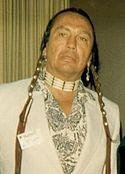Russell Means. 1987. (courtesy Wikipedia)
PORCUPINE, S.D., Oct. 22 (UPI) -- Russell Means, an activist and early leader with the American Indian Movement, died Monday at his home in Porcupine, S.D., family members said. He was 73.
Means suffered from throat cancer, the Indian Country Today Media Network said
"My dad now walks among our ancestors," his son Scott was quoted as saying. "As our dad and husband would say, 'May the Great Mystery continue to guide and protect the paths of you and your loved ones.'"
The Los Angeles Times once called Means the most famous American Indian since Sitting Bull and Crazy Horse, Indian Country Today Media Network said.
Speaking at a conference earlier this year on the Wounded Knee occupation, Means called on American Indians to remain fearless. "When it's my time to go, it's my time to go," he said. "And nobody gets out of this life alone. So have no fear," KELO-TV, Sioux Falls, quoted him as saying.
Means was a leader of militant American Indians and a prominent figure in the 71-day occupation of the reservation village of Wounded Knee in South Dakota in 1973. He joined another Indian leader, Dennis Banks, in demanding a Senate investigation of the ouster of Richard Wilson, elected tribal leader of the Oglala Sioux tribe. They also wanted a Senate committee to check on charges of mistreatment of Oglala Sioux members.
When the occupation of Wounded Knee ended, Means and Banks were tried on charges of conspiracy, assault and theft in St. Paul, Minn., in 1974. The trial lasted from February to September when the judge dismissed the charges and accused the FBI of meddling by planting an agent in the Indians' Wounded Knee legal defense committee.
Means was charged with murder in March 1975 following a barroom fight in Scenic, S.D. A jury acquitted Means after the defense attorney William Kunstler of New York convinced the members the government had generated a climate of fear among the Indians and they armed themselves in self-defense.
Means was born Nov. 10, 1939, of mixed white-Indian parentage in California. His family was impoverished. After making his way through the state's public schools, he studied accounting but was unable to get a good job because of heavy drinking. He said he spent two years as an alcoholic vagrant.
Means migrated to the Pine Ridge reservation in South Dakota where his grandparents lived, and used the militant stance of some local Indians as a prop in his attempt to stop drinking.
He joined the American Indian Movement, which Banks and Indian radical Clyde Bellecourt founded in 1968. AIM sent Means to Cleveland to serve as director of the Indian Center.
After a small army of Indian protesters marched across the country to Washington to register complaints against the government's Indian policies, Means took part in the occupation of the offices of the Bureau of Indian Affairs. The sit-in lasted a week and the intruders seized numerous files which they said supported their complaints.
He took his activism abroad on Dec. 27, 1985, saying he intended to organize support for Indian tribes battling Nicaragua's Marxist Sandinista government, which forced them off their land during the 1979 Sandinista revolution.
Means became involved with the Libertarian Party in 1983 and sought its nomination for president in 1987. He said all Americans needed to reassert their self-determination.
"I now realize that all Americans, not just Indians, desperately need to regain control of their own lives," Means told the party's delegates.
On Jan. 7, 1988, Means announced his withdrawal from his leadership role in the American Indian Movement.
He told a news conference ion Bakersfield, Calif., the American Indian Movement had been successful in "re-instilling pride and self-dignity among our people."
"AIM has worked itself out of a job," he said.
Means said when AIM was founded "my people lived in car bodies and tents," there was no Native American curriculum in the schools, and Indians were routinely ridiculed by Bureau of Indian Affairs employees.
"Now there is activism in virtually every American Indian community. AIM people are now integrated into every productive and responsible segment of Indian and non-Indian society," he said. "We have respect all over the world."
"Our model of phenomenal success should be studied in every school so people can be taught that even government can be dismantled when people begin to self-determine because they have been presented with the opportunity. We have accomplished the impossible."















